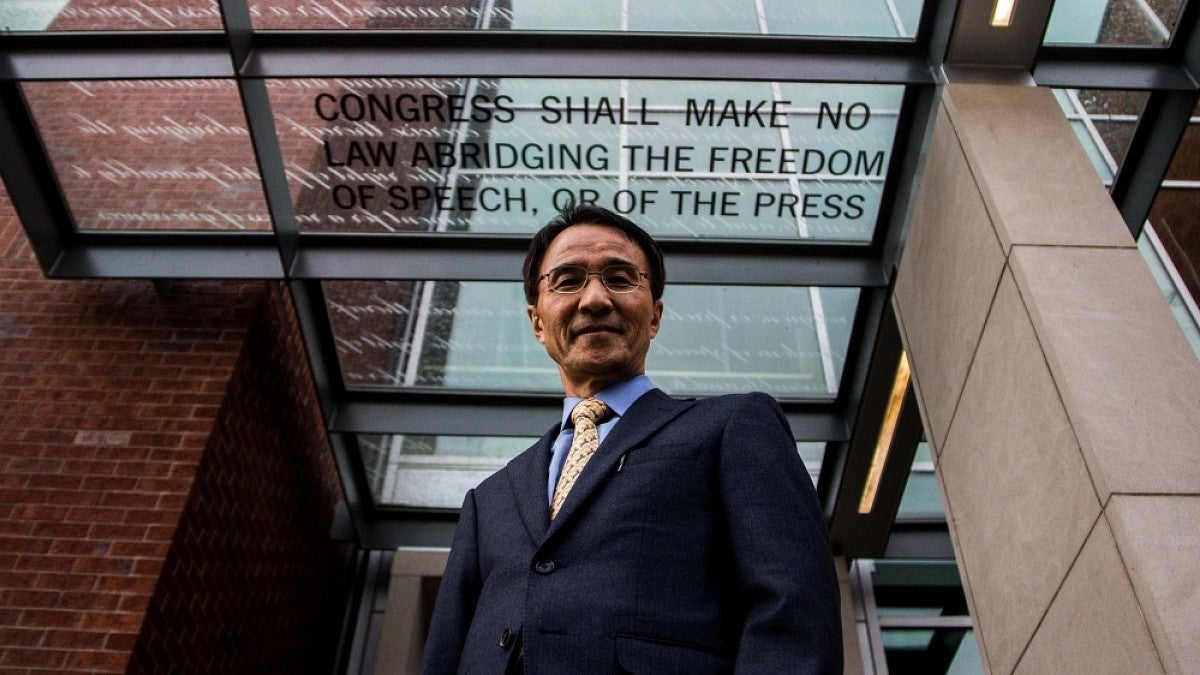Growing up in South Korea in the 1960s and ’70s, media studies professor Kyu Ho Youm did not have the same rights to freedom of expression he enjoys today, as a naturalized citizen of the United States.
That disparity has shaped his lifelong passion for free speech issues and driven him to become one of the world’s foremost experts on the subject, with research that has had a profound impact on the laws that govern freedom of expression across the globe.
“The value of freedom of speech and freedom of the press in the United States remains a beacon of hope and freedom, even though we’re going through some ups and downs,” said Youm, who has served as the inaugural Jonathan Marshall First Amendment Chair in the School of Journalism and Communication for 15 years.
Youm’s body of work, which includes a multitude of books, research papers and articles on media law, has been cited in several landmark international court cases, from the U.K. House of Lords to the Canadian Supreme Court.
His 42-page U.S. law journal article from 2012 was cited in a Philippine Supreme court opinion in 2015 examining whether media should be allowed into courtrooms during criminal cases. The court ruled against the practice, despite the fact that Youm’s work cited in the decision argues in favor of allowing a media presence in U.S. Supreme Court hearings.
In 2017, his work was extensively cited in a decision by the South African Supreme Court in a similar case involving media presence in courtrooms. This time, the court upheld the right, based in large part on Youm’s work.
It’s an unexpected life story for Youm, who recalls the struggles of coming of age in South Korea. Both of his parents were basically illiterate. His father never made it past the third grade and worked as a tobacco delivery man, and his mother never went to school at all. Youm was the only one in his family to seek higher education, made possible by a full-tuition scholarship.
“I was very much interested in challenging myself to do better,” Youm said, “and I was lucky to have parents who tried to support me in pursuing my academic passion as a teenager.”
In 1972, the South Korean government suspended its constitution and granted the president, Park Chung-hee, enormous amounts of power, turning his lifetime presidency into a legal dictatorship. Widespread protests broke out. Among the protesters was Youm, at the time a college student studying English language and literature who wanted to see more open political democracy in his country.
“The South Korean government, not surprisingly, attempted to teach me Korean ‘Democracy 101’ by sending me to an army boot camp overnight,” Youm said.
He was forced into military service for nearly three years. But whenever given the chance, he spent his free time reading Time, Newsweek and Reader’s Digest in an attempt to maintain his English language skills and keep up with world events.
As a journalism graduate student at Southern Illinois University in Carbondale in 1981, Youm took a media law class with professor Harry W. Stonecipher, one of the nation’s leading media law scholars. After class one day, Stonecipher told Youm he thought he should drop out and try again some other time.
“That kind of tough love was priceless,” Youm said.
Youm describes the class, which he passed the second time with an A, as one of the most challenging he ever took. It also changed his life, kick-starting his lifelong interest in American media law. Today, he still carries a photo of his mentor in his wallet.
Youm went on to expand his horizons in law at Yale Law School and the University of Oxford in England after several years of studying journalism at Southern Illinois University. In 2002, he came to the UO School of Journalism from Arizona State University.
After teaching media law for more than 30 years, Youm shows little sign of slowing down. He has many projects in the works, including a research paper co-written with Ahran Park, a former media law advisee in the journalism school and now a senior researcher at the Korea Press Institute in Seoul. The article on fake news as a legal issue is scheduled for presentation in January at the "Global Fake News and Defamation Symposium” at Southwestern Law School.
He is also working on a textbook for American law students focusing on international and comparative media law that should be completed in August. In April, he’s looking forward to participating as a speaker in the Global Freedom of Expression conference at Columbia University
“I will continue to enjoy teaching media law and sharing my media expertise with everyone who is interested in free speech and a free press as a fundamental human right,” Youm said.
He’s also grateful for all the opportunities he’s had in the United States.
“I always feel it is a privilege to be a professor teaching freedom of speech and freedom of the press in the United States, which I treasure,” Youm said. “If I had returned to South Korea, I doubt I’d be enjoying the kind of life I’ve been enjoying here in America, and I doubt I’d have the kind of extraordinary global opportunities I’ve had over the past 30 years.”
—By Eric Schucht, School of Journalism and Communication


